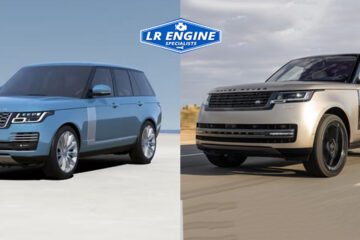Introduction:
The reliability of the Range Rover diesel engine vs. the Range Rover petrol engine has long been a topic of discussion among enthusiasts and owners. Opting between a petrol and diesel variant is not only about fuel efficiency; it’s also about long-term dependability, maintenance costs, and overall ownership experience. Some insist that diesel engines last longer, while others believe petrol engines offer comfortable performance and fewer complications.
To settle the discussion, we must explore which Range Rover engine experiences fewer breakdowns. This detailed analysis will examine the main factors like engine longevity, maintenance needs, mechanical failures, fuel system durability, and overall reliability. If you’re looking to purchase a Range Rover and want an engine with the least number of issues, this analysis will help you make an informed decision.
Understanding the Fundamental Differences
A Range Rover diesel engine vs Range Rover petrol engine reliability comparison must start with an understanding of the basic engineering of both models. Diesel engines are well-known for their powerful construction, designed to tackle higher compression ratios. This makes them more reliable in some cases but also more prone to specific issues like turbocharger failures, injector issues, and carbon buildup.
On the flip side, petrol engines have a lighter build, a lower compression ratio, and faster response. While they are famous for their effortless acceleration and excellent driving experience, they can experience ignition system failures, valve problems, and increased wear and tear due to higher RPMs. These main differences influence how often each engine breaks down over time.
Breakdown Patterns in Diesel vs Petrol Range Rover Engines
Over time, owners have observed specific mechanical patterns in both diesel and petrol Range Rover engines. Diesel engines often face EGR valve failures, DPF blockages, and turbocharger issues, while petrol engines generally experience coil pack failures, sensor malfunctions, and higher oil consumption.
One of the most noted problems in diesel variants is carbon buildup in the EGR (Exhaust Gas Recirculation) system, which can cause performance loss and costly repairs. Diesel engines also depend on turbochargers for power, and a failing turbo can result in excessive smoke, poor acceleration, and potential engine failure.
In comparison, petrol engines are more prone to misfires, spark plug failures, and oil leaks. Although they don’t experience carbon buildup in the same way diesel engines do, they need regular ignition system maintenance to avoid performance issues.
Which Engine Lasts Longer?
LMany drivers consider that diesel engines last longer than petrol engines, and in many situations, this is true. Diesel engines operate at lower RPMs, meaning they face less wear and tear over time. Also, the diesel fuel itself has better lubrication properties, which helps lessen internal engine wear.
However, longevity doesn’t always compare to reliability. Even though diesel engines may last longer, they are also more complex and costly to repair. A failing turbocharger, injector, or EGR valve can result in costly breakdowns, often needing specialized repairs.
Petrol engines are normally easier to maintain due to their simpler design, potentially leading to fewer notable failures, even if they don’t last as long as diesel engines.
Common Mechanical Failures in Diesel and Petrol Range Rovers
One of the best ways to find out which engine has fewer breakdowns is by analyzing common failure points.
Fuel System Issues: Diesel engines operate with high-pressure fuel injection, which makes them more prone to injector failures and fuel pump issues. Petrol engines, while simpler in fuel delivery, can experience fuel pump malfunctions and injector clogging, though these are normally easier to fix.
Turbocharger Failures: Diesel engines in Range Rover models depend on turbochargers, which, if not maintained properly, can fail, causing poor performance and costly repairs. Petrol engines also have turbocharged options, but naturally aspirated petrol variants tend to have fewer turbo-related problems.
Carbon Buildup and Emissions System Problems: Diesel engines often encounter DPF (Diesel Particulate Filter) blockages, resulting in loss of power and higher maintenance costs. Petrol engines, while not immune to carbon buildup, normally experience fewer emissions-related breakdowns.
Ignition and Electrical Problems: Petrol engines are more electrically dependent, which means they often experience coil pack failures, spark plug issues, and sensor malfunctions. Diesel engines, while less dependent on electrical ignition systems, can still face glow plug failures, particularly in cold weather.
Maintenance Costs and Breakdown Prevention
Reliability is more than about how often an engine breaks down, and also about much cost of repairing and maintaining over time. A Range Rover diesel engine vs Range Rover petrol engine reliability assessment must consider maintenance costs.
Diesel engines generally have higher maintenance costs due to intricate components such as turbochargers, high-pressure injectors, and emissions control systems. Routine servicing is necessary to prevent DPF clogging and EGR failures.
Petrol engines, on the other hand, have lower routine maintenance prices, but they may need more frequent servicing of spark plugs, ignition coils, and sensors. While petrol engines may break down less frequently, they need ongoing care to maintain performance and efficiency.
Which Engine Is More Reliable in the Long Run?
If reliability is your major concern, your selection between a Range Rover diesel or petrol engine depends on your driving habits.
Diesel engines are appropriate for long-distance driving and heavy towing, as they offer better fuel efficiency and torque. However, they require persistent maintenance to avoid breakdowns. If used for short city trips, diesel engines can experience DPF blockages and carbon buildup, resulting in frequent issues.
Petrol engines are perfect for shorter trips, urban driving, and high-rev performance. While they may not last as long as diesel engines, they tend to have fewer catastrophic failures and lower repair prices. For drivers who seek a hassle-free ownership experience, petrol engines are often the more reliable option.
Final Verdict:
The Range Rover diesel engine vs Range Rover petrol engine reliability debate comes down to different use cases.
If you drive long distances and need higher fuel efficiency, a diesel Range Rover may be a better option, but only if properly maintained. Otherwise, EGR failures, DPF issues, and turbocharger breakdowns can cause severe problems.
If you want a lower-maintenance engine with fewer breakdowns, the petrol version is the better choice. While petrol engines require routine servicing of spark plugs and ignition components, they typically experience fewer catastrophic failures.
Meticulous care and mindful driving are necessary for ensuring your Range Rover runs smoothly for years. Diesel engines can be more potent but need careful attention, while petrol engines offer simpler, more predictable maintenance needs.
If you want professional advice on maintaining your Range Rover diesel or petrol engine, consult LR Engine Specialists. Their expertise in Range Rover engine maintenance and repairs guarantees that your vehicle stays in top condition, even if you choose petrol or diesel.
Conclusion:
The Jaguar E-PACE engine lineup provides a diversity of options suited for different driving needs. If you give importance to fuel economy and long-distance efficiency, the D165 or D200 diesel engines are the ideal choices. For those who want a solid balance of performance and efficiency, the P250 petrol engine offers an ideal middle ground. However, if power and speed are your main priorities, the Jaguar E-PACE P300 engine is the only choice for maximum performance and driving excitement.
With proper maintenance, reliability examins, and potential performance upgrades, the Jaguar E-PACE engine can deliver an extraordinary driving experience. Even if you choose a petrol or diesel variant, understanding its specs, reliability, and tuning potential will help you get the most out of your vehicle. LR Engine Specialists can provide deep insights and services to guarantee your Jaguar E-PACE engines performs at its best.
FAQs:
Which engine is more reliable, diesel or petrol?
Petrol engines generally experience fewer severe failures, while diesel engines need more maintenance but can last longer if properly cared for.
Do diesel Range Rovers have more breakdowns than petrol ones?
Diesel models are more susceptible to turbocharger, DPF, and EGR failures, whereas petrol engines mainly experience ignition-related issues such as coil and sensor failures.
Which engine is better for city driving?
Petrol engines are better for city driving, as short trips can result in diesel engines developing DPF blockages and carbon buildup.
Are diesel engines more expensive to maintain than petrol ones?
Yes, diesel engines normally have higher maintenance costs due to complex components such as turbochargers and high-pressure fuel systems.
Which engine lasts longer, diesel or petrol?
Diesel engines normally have a longer lifespan due to lower RPM operation, but they need diligent maintenance to prevent expensive failures.


